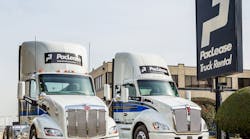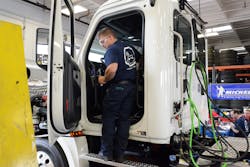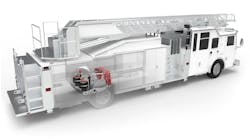The options for a fleet to acquire trucks are not limited to buying new or used – there are also the options of renting or leasing. These may be attractive to fleets who require newer vehicles but don’t have the budget to purchase them, those who don’t have the capabilities or facilities to maintain their vehicles, or those who need the use of vehicles on a more flexible, short-term basis.
Fitting the budget
As a business, the primary concern for any fleet is financial stability. Since trucks are typically a major portion of a fleet’s expenditures, it may not make sense for all fleets to purchase equipment outright.
“As a rule of thumb, if the purchase cost of your vehicles will hinder the growth of your primary business, it's probably a good idea to consider leasing to protect your capital,” says Chuck Davis, director of sales for Paccar Leasing (PacLease). “A primary goal of all companies is to obtain the best financial return on its money, which includes acquiring a single vehicle or a fleet of trucks. With leasing, you’re paying for the use of the vehicle, and since you don’t own the vehicle, the residual value is backed out. The monthly cost is less than if you financed in ownership.”
If keeping monthly payments low is a fleet’s priority, leasing typically has an advantage over buying new.
Fulfilling the needs
Purchasing used vehicles may appear to be a financially sound option, but some fleets require unique specifications that are not easy to find on used trucks. Or, fleets may prefer to operate newer trucks to maintain a certain image and to retain drivers, which is especially important during the current driver shortage.
Similar to ordering new vehicles, leases can be custom specified to meet a fleet’s needs.
“We work with all of our customers and companies to make sure the vehicle is engineered to their specification,” says Jim Lager, senior vice president of sales at Penske Truck Leasing. “That could be things like driver comfort, creature comforts, or actual mechanical operation of the vehicle. But when we order a new vehicle, it is specified specifically for that customer and that customer's application.”
Maintenance considerations
Many fleets have in-house maintenance staff and facilities, but others do not. Some fleets rely on third-party maintenance companies, but the fleet still needs to have a handle on its service and maintenance to ensure the trucks are being managed properly to maximize uptime and useful service life.
“Many companies have their trucks in different areas around the country,” says Joe Gallick, senior vice president of national account sales at NationaLease. “What's the maintenance infrastructure that supports that? Is it a company maintenance infrastructure? Or are they relying on the third-party to provide maintenance services for those assets? Even if they are doing the latter, the fleet owner will still need to have the maintenance understanding and knowledge in order to manage third parties that are turning wrenches both from a preventive maintenance [and] also from an unscheduled maintenance standpoint.”Those fleets without the capacity to service and maintain their vehicles may find full-service leases to be an attractive option. With full-service leases, the lessor provides all service and maintenance to the trucks, including preventive and unscheduled maintenance.
“[With] full service leasing, that vehicle is covered by us,” says Penske’s Lager. “Any of the mechanical aspects of that vehicle, the cleanliness, the fueling of, all those things are services that we provide. It's really turnkey for the operator.”
Full-service leasing also offers minimal interruption in case of unscheduled maintenance. Lager says that if a lessee’s truck should encounter issues that require it to be removed from service, Penske will provide a loaner truck until the lease truck is repaired and returned to the fleet.
Rent-a-truck
Fleets just starting out, those with routes that fluctuate, or those who need ultimate flexibility may find value in renting instead of leasing or buying. Rentals can also be useful for fleets to test out different truck OEMs or new technologies before they decide to purchase or lease long term.
“[A fleet will] rent a truck – maybe they're starting a business, maybe their business is growing, they're not sure if it's going to continue – so they rent a truck for some period of time,” says Penske’s Lager. “The rental gives them more flexibility. They’re going to pay a little bit higher rate than they would with leasing a truck, but they have the ability to turn that truck in at any time. You normally see customers start with rental, kind of get established, whatever that looks like, and then they move into a more permanent situation.”
Renting and leasing both offer advantages over purchasing new or used vehicles, but the financial benefits may be short-term. While monthly payments for a lease will likely be lower than that for purchasing a vehicle, the overall cost to the fleet may end up being greater. In the end, it is up to each fleet to determine the solution that makes the most financial sense.





